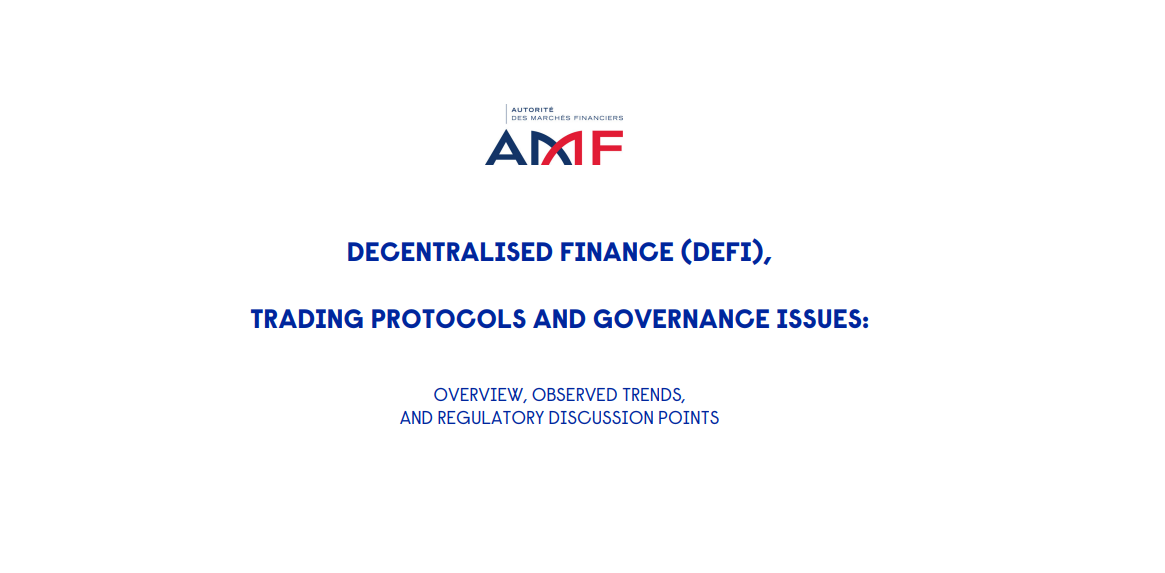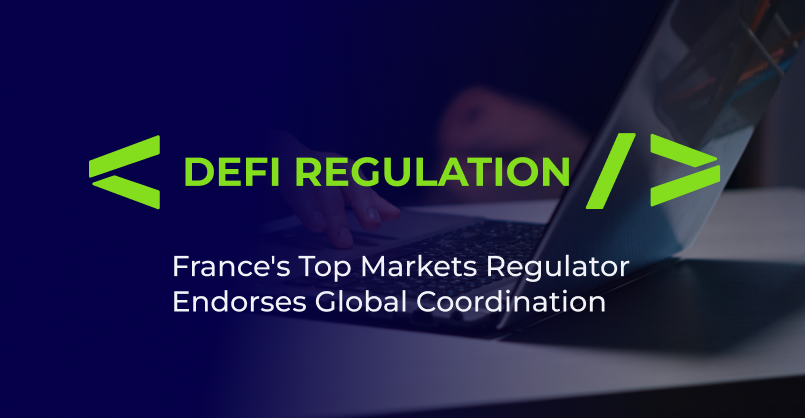DeFi Regulation: France’s Top Markets Regulator Endorses Global Coordination
Written by
Krista Alvarez
Published on
June 19, 2023
Time reading
6 minutes

France’s Autorité des Marchés Financiers (AMF) advocates for globally coordinated DeFi regulation. Blockchain technology has disrupted the digital economy’s technological infrastructure, offering innovative solutions powered by distributed ledger technology. Among these disruptions, Decentralized Finance (DeFi) has emerged as an alternative to traditional financial services, encompassing activities such as lending and investing. However, DeFi operates on automated blockchain infrastructure, presenting novel characteristics that necessitate a closer examination of its risks and regulatory implications.
Defining DeFi and its Unique Characteristics
DeFi stands for Decentralized Finance, leveraging automated blockchain infrastructure to replace traditional centralized institutions with protocols and smart contracts. These protocols, powered by blockchain technology, allow for the execution of various financial activities, including lending and trading. Unlike traditional finance, DeFi operates in a decentralized and disintermediated manner, devoid of a central governing entity.
The Rise of Regulatory Questions
The crash of the Terra / Luna protocol in May 2022 has brought the regulatory challenges of DeFi to the forefront. Questions surrounding the need for regulation in the DeFi space have intensified, prompting regulators to examine the sector more closely. The Autorité des Marchés Financiers (AMF) has released a discussion paper addressing these concerns and soliciting input from industry stakeholders.
Recognizing the cross-border nature of DeFi activities, the AMF advocates for a global coordinated approach to regulation. This approach aims to establish a level playing field while safeguarding investor protection and fostering innovation. The AMF aligns with global standard-setters like the Financial Stability Board (FSB) and the International Organization of Securities Commissions (IOSCO), both actively working towards developing regulatory standards for the DeFi sector.
Challenges in DeFi Regulation
Unlike centralized crypto exchanges that can be regulated within specific jurisdictions, DeFi protocols pose a unique challenge due to the absence of a specific entity to target for compliance. The lack of centralization and disintermediation inherent in DeFi make it difficult to categorize participants and enforce regulatory measures effectively. Regulators are grappling with finding a balanced approach to regulate DeFi without stifling innovation.
The AMF emphasizes the importance of engaging stakeholders, both public and private, in developing a balanced regulatory framework. The discussion paper seeks to encourage dialogue with ecosystem participants, considering their perspectives and insights. By involving a wide range of stakeholders, the AMF aims to create a regulatory framework that supports the sound development of decentralized finance in the long run.

Understanding Protocols in DeFi
Protocols in DeFi are standardized sets of rules that enable computers to format, process, and transmit data. They form the basis for decentralized financial activities and facilitate the execution of transactions within a distributed ledger network. Similar to traditional protocols, DeFi protocols can operate across different layers, with the Ethereum blockchain serving as the primary infrastructure for DeFi. Ethereum’s layered approach allows for the development of additional protocols and smart contracts, expanding the capabilities of the DeFi ecosystem.
The decentralized nature of DeFi stems from the operation of blockchain protocols across a network of nodes, with no single party making decisions on transaction processing or participation. However, the degree of decentralization may vary among different DeFi protocols. While Ethereum is associated with the emergence of DeFi, other blockchains like Solana, Cardano, Polkadot, and Hyperledger also offer similar functionalities, albeit with certain distinctions. The permissionless or permissioned nature of these blockchains influences the level of decentralization within DeFi.
The Evolving Landscape of DeFi Regulation
The rapid growth of Decentralized Finance (DeFi) has posed unique regulatory challenges that require careful consideration. Unlike traditional financial systems, DeFi operates on decentralized and disintermediated protocols, raising questions about investor protection, market integrity, and systemic risks. To achieve the DeFi regulation goal, France’s top markets regulator, the Autorité des Marchés Financiers (AMF), has expressed support for globally coordinated regulations that strike a balance between innovation and safeguarding the interests of market participants.
DeFi represents a paradigm shift in financial services, offering an alternative to traditional banking and intermediation. By leveraging blockchain technology, DeFi protocols enable users to engage in activities such as lending, borrowing, and trading without relying on centralized institutions. Automated smart contracts and decentralized governance systems known as DAOs facilitate secure and transparent transactions, reducing the need for intermediaries.
Understanding the Need for DeFi Regulation
While DeFi presents exciting opportunities for financial inclusion and innovation, it also raises concerns about consumer protection, market manipulation, and illicit activities. The crash of the Terra protocol in 2022 highlighted the potential risks associated with DeFi and underscored the importance of establishing a regulatory framework that fosters trust and stability. Regulators around the world, including the AMF, have recognized the need to introduce DeFi regulation frameworks.
The AMF acknowledges the complexities of DeFi regulation due to its decentralized nature and lack of a central entity to hold accountable. The paper serves as a starting point for dialogue and invites industry stakeholders to contribute their insights and the DeFi regulation perspectives. The AMF aims to develop a comprehensive regulatory approach that ensures a level playing field while fostering innovation by actively engaging with both public and private sector participants.
A Global Coordinated Approach to DeFi Regulation
The AMF advocates for a globally coordinated approach to DeFi regulation, recognizing the cross-border nature of decentralized finance activities. Collaboration among regulators worldwide is crucial to harmonize standards, prevent regulatory arbitrage, and promote consistency in investor protection measures. The Financial Stability Board (FSB) and the International Organization of Securities Commissions (IOSCO) are actively working on developing regulatory recommendations for the DeFi sector, with the AMF expressing full support for these initiatives.
Regulating DeFi poses unique challenges compared to traditional financial systems. The absence of a centralized authority makes it difficult to enforce compliance and ensure the integrity of the market. The rapidly evolving nature of DeFi and the constant emergence of new protocols require regulators to adopt agile approaches that keep pace with innovation. Balancing investor protection with fostering innovation remains a key challenge for regulators worldwide.
Engaging Stakeholders for a Balanced DeFi Regulation Framework
To develop a comprehensive regulatory framework for DeFi, the AMF emphasizes the importance of engaging stakeholders from various sectors. The AMF aims to gain a deeper understanding of the benefits, risks, and potential impact of DeFi regulation. This collaborative approach ensures that regulatory decisions are informed, balanced, and conducive to the long-term development of decentralized finance.
While regulators have a responsibility to protect investors and maintain market integrity, it is equally important to foster an environment that encourages responsible innovation. Excessive and burdensome regulations can stifle innovation and drive DeFi activities underground. Striking the right balance between oversight and flexibility is crucial to create a regulatory framework that promotes responsible growth, encourages entrepreneurial endeavors, and protects investors from fraudulent activities.
DeFi Regulation: The Path Forward
The DeFi landscape continues to evolve, and regulators face the ongoing challenge of adapting to technological advancements and emerging risks. The AMF’s commitment to engaging with stakeholders and actively participating in global initiatives demonstrates its dedication to addressing the regulatory challenges posed by DeFi. By working collaboratively, regulators, market participants, and innovators can shape a regulatory framework that not only safeguards investors but also encourages the responsible growth of decentralized finance.
The rise of DeFi presents an exciting opportunity to transform traditional financial systems. However, to ensure its long-term success and stability, it is imperative to establish a balanced DeFi regulation framework. The AMF’s support for globally coordinated regulation and its engagement with stakeholders exemplify the commitment to address the unique challenges posed by DeFi while fostering innovation. By nurturing responsible growth and maintaining investor protection, regulators can unlock the full potential of decentralized finance in the global economy.
Source: coindesk.com